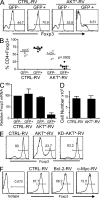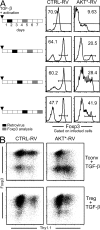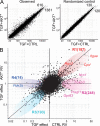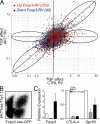The AKT-mTOR axis regulates de novo differentiation of CD4+Foxp3+ cells
- PMID: 18283119
- PMCID: PMC2275380
- DOI: 10.1084/jem.20071477
The AKT-mTOR axis regulates de novo differentiation of CD4+Foxp3+ cells
Abstract
CD4(+)Foxp3(+) regulatory T (T reg) cells play an essential role in maintaining immunological tolerance via their suppressive function on conventional CD4(+) T (Tconv) cells. Repertoire studies suggest that distinct T cell receptor signaling pathways lead to T reg differentiation, but the signals that regulate T reg specification are largely unknown. We identify AKT as a strong repressor of entry into the T reg phenotype in vitro and in vivo. A constitutively active allele of AKT substantially diminished TGF-beta-induced Foxp3 expression in a kinase-dependent manner and via a rapamycin-sensitive pathway, implicating the AKT-mammalian target of rapamycin axis. The observed impairment in Foxp3 induction was part of a broad dampening of the typical T reg transcriptional signature. Expression of active AKT at a stage before Foxp3 turn on during normal T reg differentiation in the thymus selectively impaired differentiation of CD4(+)Foxp3(+) cells without any alteration in the positive selection of Tconv. Activated AKT, in contrast, did not affect established Foxp3 expression in T reg cells. These results place AKT at a nexus of signaling pathways whose proper activation has a strong and broad impact on the onset of T reg specification.
Figures







Similar articles
-
mTORC1 couples immune signals and metabolic programming to establish T(reg)-cell function.Nature. 2013 Jul 25;499(7459):485-90. doi: 10.1038/nature12297. Epub 2013 Jun 30. Nature. 2013. PMID: 23812589 Free PMC article.
-
The receptor S1P1 overrides regulatory T cell-mediated immune suppression through Akt-mTOR.Nat Immunol. 2009 Jul;10(7):769-77. doi: 10.1038/ni.1743. Epub 2009 May 31. Nat Immunol. 2009. PMID: 19483717 Free PMC article.
-
CD4+ FoxP3+ regulatory T cells confer infectious tolerance in a TGF-beta-dependent manner.J Exp Med. 2008 Sep 1;205(9):1975-81. doi: 10.1084/jem.20080308. Epub 2008 Aug 18. J Exp Med. 2008. PMID: 18710931 Free PMC article.
-
Foxp3+ regulatory T cells: differentiation, specification, subphenotypes.Nat Immunol. 2009 Jul;10(7):689-95. doi: 10.1038/ni.1760. Nat Immunol. 2009. PMID: 19536194 Review.
-
Human regulatory T cells: a unique, stable thymic subset or a reversible peripheral state of differentiation?Immunol Lett. 2007 Nov 30;114(1):9-15. doi: 10.1016/j.imlet.2007.08.012. Epub 2007 Sep 29. Immunol Lett. 2007. PMID: 17945352 Free PMC article. Review.
Cited by
-
Lipid and Protein Co-Regulation of PI3K Effectors Akt and Itk in Lymphocytes.Front Immunol. 2015 Mar 13;6:117. doi: 10.3389/fimmu.2015.00117. eCollection 2015. Front Immunol. 2015. PMID: 25821452 Free PMC article. Review.
-
New immunotherapies targeting the PD-1 pathway.Trends Pharmacol Sci. 2015 Sep;36(9):587-95. doi: 10.1016/j.tips.2015.06.005. Epub 2015 Jul 7. Trends Pharmacol Sci. 2015. PMID: 26162965 Free PMC article. Review.
-
BPTF Is Essential for T Cell Homeostasis and Function.J Immunol. 2016 Dec 1;197(11):4325-4333. doi: 10.4049/jimmunol.1600642. Epub 2016 Oct 31. J Immunol. 2016. PMID: 27799308 Free PMC article.
-
Selection of regulatory T cells in the thymus.Nat Rev Immunol. 2012 Feb 10;12(3):157-67. doi: 10.1038/nri3155. Nat Rev Immunol. 2012. PMID: 22322317 Review.
-
TCR ligand density and affinity determine peripheral induction of Foxp3 in vivo.J Exp Med. 2010 Aug 2;207(8):1701-11. doi: 10.1084/jem.20091999. Epub 2010 Jul 26. J Exp Med. 2010. PMID: 20660617 Free PMC article.
References
-
- Schwartz, R.H. 2005. Natural regulatory T cells and self-tolerance. Nat. Immunol. 6:327–330. - PubMed
-
- Sakaguchi, S. 2004. Naturally arising CD4+ regulatory T cells for immunologic self-tolerance and negative control of immune responses. Annu. Rev. Immunol. 22:531–562. - PubMed
-
- Fontenot, J.D., and A.Y. Rudensky. 2005. A well adapted regulatory contrivance: regulatory T cell development and the forkhead family transcription factor Foxp3. Nat. Immunol. 6:331–337. - PubMed
-
- Sakaguchi, S., M. Ono, R. Setoguchi, H. Yagi, S. Hori, Z. Fehervari, J. Shimizu, T. Takahashi, and T. Nomura. 2006. Foxp3+ CD25+ CD4+ natural regulatory T cells in dominant self-tolerance and autoimmune disease. Immunol. Rev. 212:8–27. - PubMed
-
- Hori, S., T. Nomura, and S. Sakaguchi. 2003. Control of regulatory T cell development by the transcription factor Foxp3. Science. 299:1057–1061. - PubMed
Publication types
MeSH terms
Substances
Associated data
- Actions
Grants and funding
LinkOut - more resources
Full Text Sources
Other Literature Sources
Molecular Biology Databases
Research Materials
Miscellaneous

